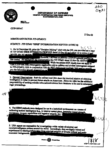Censor bars
Censor bars (or boxes) are a basic form of text, photography, and video[1] censorship in which "sensitive" information or images are occluded by black, gray, or even white rectangular boxes. These bars have been used to censor various parts of images.[2][3] Since the creation of digital editing software which can apply less obtrusive effects such as pixelization and blurring, censor bars are usually only used for satirical purposes.[4][5][6]
Illustrations of censor bar usage
-
.png)
A 1965 FBI surveillance photograph
-

A heavily redacted page from the lawsuit American Civil Liberties Union v. Ashcroft
-
.jpg)
Censor bars applied to an academy painting
-

Censor bars applied to a photo
-

Identity masking of a human face
See also
References
- ↑ "Censor Box - Television Tropes & Idioms". Tvtropes.org. Retrieved 2012-01-22.
- ↑ The Purple Decades: A Reader, Tom Wolfe, p. 78
- ↑ Context Providers: Conditions of Meaning in Media Arts, Margot Lovejoy & Christiane Paul & Victoria Vesna
- ↑ Banned in the media: a reference guide to censorship in the press, motion pictures, broadcasting, and the internet, Herbert N. Foerstel, p. 208
- ↑ Click: The Forces Behind How We Fully Engage with People, Work, and Everything We Do, Ori Brafman & Rom Brafman, p.108
- ↑ http://qahera.tumblr.com/post/61173083361
External links
| Wikimedia Commons has media related to Censor bars. |
This article is issued from Wikipedia - version of the 11/4/2016. The text is available under the Creative Commons Attribution/Share Alike but additional terms may apply for the media files.

